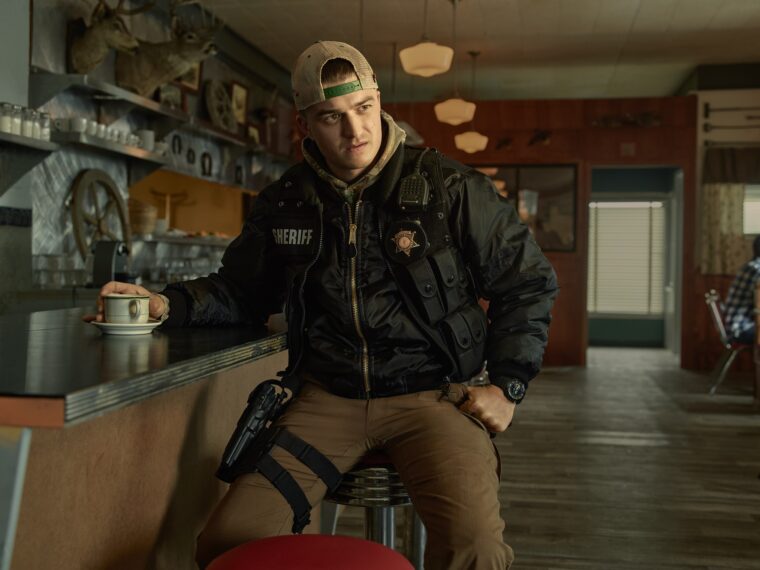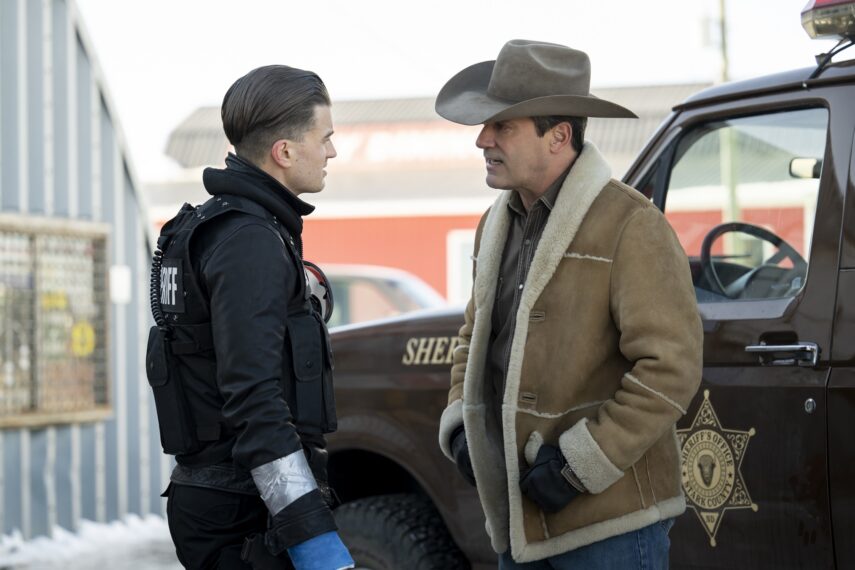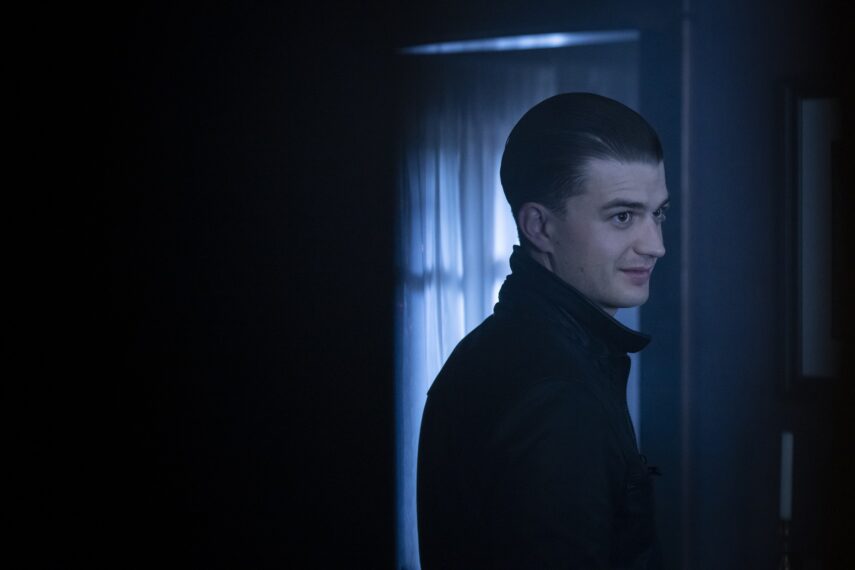When it comes to FX‘s Fargo, the hit anthology series never shies away from star-studded casting, so it makes perfect sense that Stranger Things favorite Joe Keery made the Year 5 cut, but his character Gator Tillman was nothing like ’80s good guy Steve Harrington, and that’s part of the fun.
Introduced as the try-hard son of Jon Hamm‘s rogue North Dakota sheriff, Roy Tillman, Keery’s Gator embraced misogyny, racism, and crooked policing, but underneath it all, he’s really just a product of his abusive father’s upbringing, giving the actor plenty to delve into with a layered performance throughout the season’s 10 episodes.
TV Insider caught up with Keery to talk about the challenges of tackling a role so different from his Stranger Things roots, how he avoided the character becoming a caricature, that nail bat, and his biggest takeaways from the limited series, below.
You’ve built up a lot of goodwill with your fan-favorite performance as Steve on Stranger Things. Did you have any apprehension about playing Gator who is so different from Steve on the likeability scale or was the part of the fun?
Joe Keery: It was really like a perk. Honestly, I would have done anything in Fargo, I would have been a guy 300 yards in the distance of the background of a scene. I love that show. And so I was just really pumped to be a part of it, and that Noah [Hawley] wanted to work with me, and that the audition process worked out. The fact that the character was different from something I’ve ever been given the opportunity to do was the cherry on top. A lot of the people know me from [Stranger Things] and I think a lot of people who work on long shows have trouble breaking out into different things. Part of my job is to diversify the parts that I have taken and try to build out. Those are the actors that I really respect, who can do a lot of different things. And it would be cool if I could do that as well. This role just dropped in my lap at the right time.

Frank W Ockenfels III/FX
Gator isn’t the brightest and it’s clear he’s pulling from some aspects of our own reality. Was there any particular individual or inspiration behind your approach? And was there a specific prop or tool you used to find your way into the character? Perhaps that vape?
It was the magic vape [Laughs]. Yes, the same thing sort of happened with Steve on Stranger Things. When I read that script, I just felt like I had a reference point in my head for a guy like this. And obviously, the reference points were way different. When I read the first and second episodes, I had a touchstone in my head of [different people or bits from movies that I could] just blend it all together. It really felt like, what is this person trying to hide? It felt like the exterior of this guy is one thing, but then the inner life of this guy is something completely different.
He’s a character that has a lot of conflict baked into him from a turbulent upbringing and that’s really fun. A character who is full of contradictions and somebody who is confused. It just made for an interesting ride because you’re constantly not so sure about the character. He’s a guy that you start out feeling one way about, but then by the end of the show, you end up feeling a different way about him. It’s not quite as cut and dry. So that was really fun for me. And that’s what you hope for in a part, something that’s complex.
Going off of that idea, Gator interacts with each character on the show differently in the sense that he approaches situations with Dot (Juno Temple) differently than with Roy or Witt (Lamorne Morris). How did you define those approaches? Was it about putting up a mask and which character is he most honest with?
He’s probably the most honest with [Dot], I would say, I think because she knew him at a very young age, he maybe doesn’t feel the need to put up the shell or he’s a little bit more disarmed by her. I wasn’t thinking about how I was going to be different with all these people. It was based on the writing and the performances of the other actors. And I think if you take out one of us and put in a different actor things would be different. It really is the genius of casting and why Rachel [Tenner] did such a good job this season because the job is to feed off what the other person is giving you.

Michelle Faye/FX
When I was reading that audition scene [between Witt and Gator] in the evidence room, that read so differently than how we ended up doing it on the day. That’s what can happen if you’re locked in with the other actor, and I really felt that way with Lamorne, and I feel like we had so much fun working on this… with every actor. You find out a lot about your character based on how they interact with other people and that was the for sure the case with Gator. I really relied on my other actors.
Towards the end of the season, it’s kind of ironic that it takes Gator literally being blinded by Ole Munch (Sam Spruell) to see his dad clearly. Or did he always know who Roy was?
I can’t take too much credit for that. But I think if he chose to believe anything else about his father, it would have really shattered his whole worldview. His whole life was built upon making his dad happy and finally showing his dad that he could be the man that he wanted him to be. And that’s an endless feedback loop that’s never going to happen. So it took some seismic shift in his life and unfortunately, that just had to be him losing his eyes.
Was it tough performing with the blindfold or was it see-through?
Yeah, for some of it, they offered the see-through thing but to be honest with you it was really great to act without sight and [understand] what the character is going through. I had to be more present in my other senses. When you’re acting sometimes, there’s a big honking camera right in your face. Sometimes you can’t even see the other actor because they’re so in your face. So if you take that out of the equation, it was nice for a change to be totally unaware of everything else. The only thing I could do was listen to what the other person was saying and take the visual stimulus out of the equation. I felt like some of those scenes were the easiest to quiet myself down, listen, and try to lock in. So it was a fun challenge for me actually, more than anything else.

Michelle Faye/FX
Gator really is for lack of a better word, stupid. How do you balance his naivety and willing ignorance to avoid becoming a caricature?
He just takes himself so seriously. I think you have to take yourself seriously in order to do things that are so stupid. Blind self-confidence is one of the traits I feel he has despite his ineptness and inability to see things all the way through. It is a fine line but Fargo is a funny show. So sometimes him being stupid, like when he’s in the car and his partner is getting killed and he’s eating beef jerky… that’s funny but he doesn’t think he’s being funny. It just depends on the writing and then the delivery. This show has a really specific tone that is true to the identity of the original movie. So I guess it’s trying to capture a little bit of that.
I think the pep talk is really effective, as silly as it must have felt to do when Gator’s calling himself a “winner.”
Yeah, that was an added scene, [which is] a testament to Noah. He can see the season from a character’s point of view. You can flip through in a way you can see the whole arc. And I think he saw a little bit of a hole there and we were shooting some other stuff in the bedroom when I’m drinking a beer and getting ready to go find Munch. And at the last minute, he came up to me and pitched this idea for a scene and we ended up developing that. I’m just repeating this little mantra, and I think if you only saw that one scene from the show, you would totally understand who Gator is right away. It’s such a great choice. That was a real revelation of a day and made me think, “Oh my god, Noah is a bad a**.”
You also picked up a nail bat during the Halloween kidnapping of Dot, not dissimilar to the one used by Steve on Stranger Things. Was that discussed on set and did you pick up on that while filming?
I noticed but I didn’t say anything because I was like, “Hmm, there must, there must be some sort of reason for this…” Yeah, it wasn’t, it wasn’t discussed. I didn’t bring it up.
What is your biggest takeaway from the experience of working on Fargo?
It was a huge turning point for me and my career. It was just a big opportunity. And, obviously, I love Stranger Things, but this is like, maybe a little bit more mature content. It’s meant for a different audience. And so it was fun for me to branch out and do something like that and be trusted by someone who I really respect with a role like this. It was a real learning experience and to work with the caliber of actors that I was working with, it felt like each day I was showing up was another opportunity to pick something else up and learn from all these people who are working on this show in front of the camera behind the camera.
It was like a really special experience. And it was a difficult experience too. It wasn’t easy. I just had a blast and it’s cool to be able to talk about it now because so much of being an actor is looking forward. Seldom do you look back and I feel like this is giving me a great opportunity to look back and reflect on the experience that I had and I think it means a lot more to me now than when I was doing it.
FX’s Fargo, Year 5, Streaming now, Hulu
